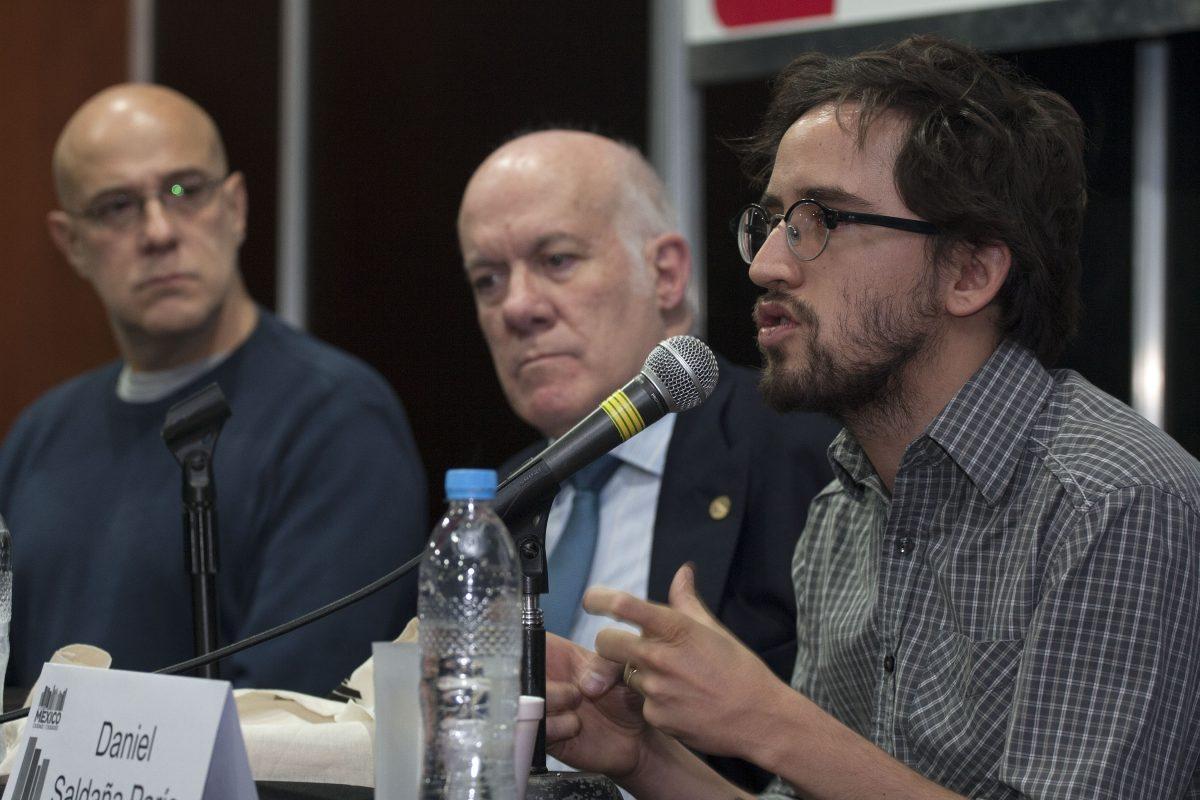UTD’s Center for Translation Studies hosted authors Daniel Saldana Paris and Eduardo Rabasa for a Monday night event to discuss literature, translation and the importance of the written word. Saldana Paris and Rabasa are members of the Bogota39, a UNESCO initiative to identify 39 promising Latin American writers under the age of 39. Essayist, poet and novelist Saldana Paris’ first novel “Among Strange Victims” was shortlisted for the Best Translated Book Award. Rabasa founded Sexto Piso, an independent publisher in Mexico, and began writing novels soon after, starting with his debut “A Zero-Sum Game.”
Q: Can you explain a bit about your background?
Daniel Saldana Paris: I was born in Mexico City, grew up in Mexico, then studied philosophy in Spain. I started writing short articles about visual arts. That’s how I began publishing what I wrote. I got a grant from the Mexican government to write a poetry collection in 2006, so I moved back to Mexico from Spain and wrote a poetry collection, then a second one, then I started working on a novel which eventually came out in 2013 in Spanish and then was published in the U.S. by Coffee House Press. I got to travel a little bit around the U.S. when the book came out and did a couple of residencies and now do some translating in French and English.
Eduardo Rabasa: I was also born in Mexico City and studied at the national university. I did my thesis on George Orwell, a super important influence in my writing. After university, I started with some friends a publishing house called Sexto Piso in 2002, and it’s been 16 years there. When I was 27, I had a deep personal crisis, and one of the ways of trying to understand what was happening to me was to write my first novel, which in English is called “A Zero-Sum Game.” It got some attention and was translated into English and French and will come out in German in the next year. It encouraged me to try and keep writing and to balance the writing with my work as a publisher. So I wrote the second novel, published last year, and I have a short story coming out next year.
Q: What is the driving passion behind your work?
DSP: For me, it’s language itself. The love for language but also for what language can do, which is communicate and reach to other people. It’s the love of the sound of language, the structure of language, but also the meaning and conveying that meaning to reach other people and explore relationship with others. Definitely involves a reader as a part of the equation.
Q: What is it like to be part of the Bogota39?
DSP: I think it can be a bit dangerous to focus too much on these recognitions and honors because the most important part for me is elsewhere, in liking what I do myself and the fact that somebody else likes it is secondary even though it is important. But it’s been great in the sense that it put me in touch with many other writers from Latin America, and I got to read most of them and to think about the way they solve some aspects of the writing with their work. It improved my life as a reader, firstly, and as a writer in the second place.
ER: I’m also a bit ambivalent about it. I’m grateful for this recognition and for trips like this to come and talk to people. There are some really strong bonds between some of us and that part has been great because you belong to a group with people who share some interests. But there’s the thing about “best…” what is the best Latin American author? I think it can create this sense of self-satisfaction, like we are the chosen ones. It has its good things and its bad things.
Q: What are you reading right now?
DSP: I try to read one novel and one nonfiction book at the same time. Nonfiction, I’m reading Alejandro Zambra’s “Not to Read” and I’m also reading Valeria Luiselli’s new novel “The Lost Children Archive,” which will come out next year.
ER: I have to read a lot of books at work for my publishing house, so when I read in my spare time, I try to focus on classical books that I have never had the chance to read. Right now I’m reading “The Heart is a Lonely Hunter” and also a book by a Slovenian philosopher called “Anguish,” which is about how anguish is one of the driving forces for the current social political system.
Q: Do you have advice you’d give to your younger self?
DSP: I would tell myself to be more open and don’t decide from the start if I don’t like something, because I feel that when I was younger, I would read something and immediately decide if I like it or not. Sometimes you have to force yourself to read something that maybe is not so pleasant at the beginning and in the end, it’s reading that informs your worldview and your relation with the world. Be a little more open and don’t trust your judgment so much.
ER: Try to be more confident. Since I came a bit late into writing, by accident in a way, I’ve always been especially uneasy about it, and I spend a lot of time thinking about things that are not really that important. So I would try to focus more on just doing it and not on the things that surround being a writer.







